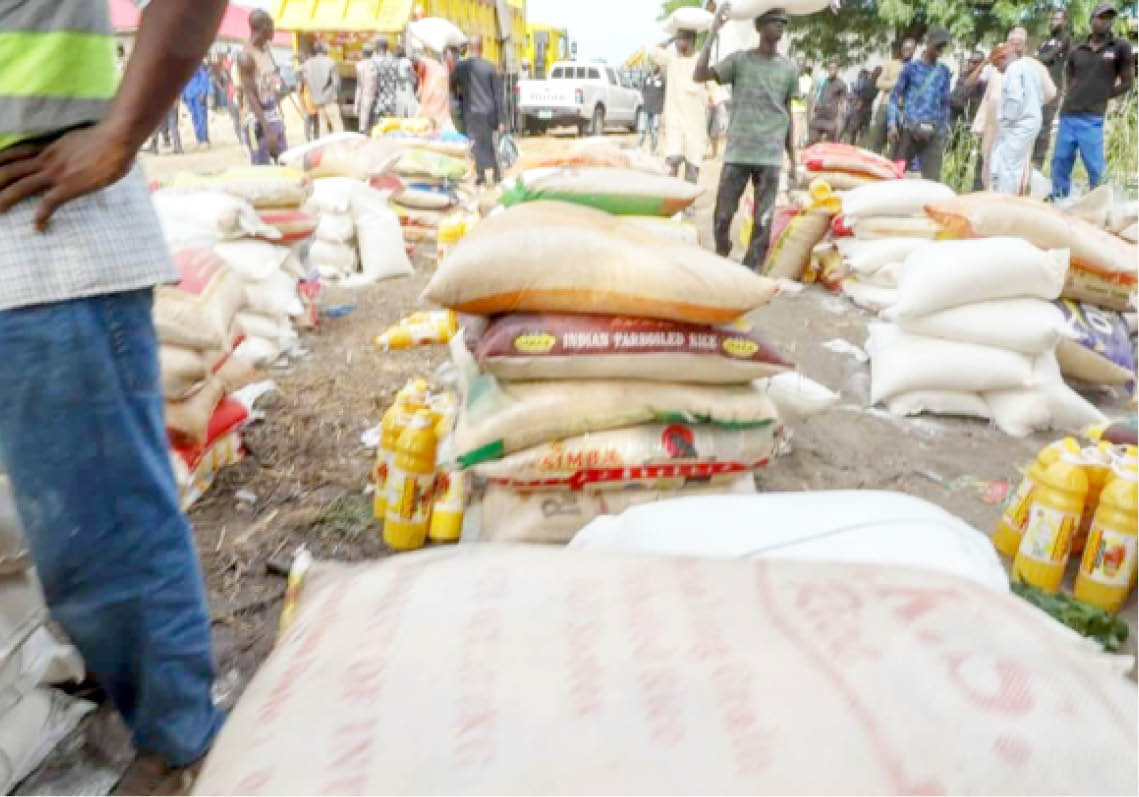As thousands of residents resettle in Baga town, the hitherto economic hub of Borno State, following the gradual return of normalcy, there is the urgent need for food and provision of other essential services for the returnees to live their normal lives.
The town, located along the Lake Chad shore, was first deserted about six years ago following attacks by insurgents. Those who later returned were again forced to flee their homes due to subsequent attacks and sought refuge in Internally Displaced Persons (IDPs) camps in Monguno and Maiduguri towns.

Governor Babagana Umara intimated the army of his government’s resolution to return the inhabitants of the town this year and so went there in July and September to assess the situation on ground, preparatory to resettlement exercise. The governor’s convoy was attacked in both visits by suspected insurgents. Many people, mostly security personnel, were killed in the latter incident.
A committee was thereafter instituted for the safe return of residents by the governor on September 26.
“Sequel to the reply Borno State Government received in response to our official letter to the Chief of Army Staff (COAS), Lt. General Tukur Yusuf Buratai, informing him of our intention to return the Baga IDPs back to the ancestral homes to continue with their normal life and livelihoods on 26th August 2020, he replied that it is possible for the IDPs to return on 26th September 2020 instead of 26th August 2020 which the state government fixed,” the governor said while inaugurating the committee.
Displaced persons in Monguno were taken back to the town in batches before those in Maiduguri and other areas.

Most of the returnees said though they were happy to resettle in Baga, they were still living a boring life for now because both commercial and subsistent fishing activities have not taken off for fear of terrorists’ attacks’ while farmers are also scared to return to their farms. They complained of frequent robberies along Gajiram-Monguno road which prevent the supply of merchandise to the town.
Shettima Muhammad, who returned to Baga in September after spending five years at an IDP camp in Maiduguri, said he was happy to restart life in the town even in the face of ‘humongous’ challenges such as lack of shelter, communication services and schools.
Muhammad said schools were being reconstructed and had not started running classes but the public hospital was manned by few medical personnel.
“My kids were taken back to Maiduguri to write exams and continue schooling because schools have not reopened. This is the major challenge facing parents which must be addressed soon. We are aware of the difficulties in the town but teachers should mobilize to return to work,” he said.
According to him, very few houses and public buildings were reconstructed after they were destroyed by insurgents and most returnees were rather stranded.
“There is still the unresolved problem of displacement because our houses have not been rebuilt but authorities have promised to reconstruct all the houses destroyed. Schools, hospitals and police stations have been rebuilt while the houses of traditional rulers have also been reconstructed,” he explained.
He said most inhabitants, whose houses were not badly damaged, rendered assistance to those who do not have a roof over their heads by giving them temporary accommodation while others resettled in houses whose owners were yet to return on the condition that they must vacate them upon demand by the real owners,” he said.
Insurgency in the area had disrupted agricultural production as well as other means of livelihood Muhammad stated, adding that there was the need to scale up humanitarian support due food shortages.

“We have accepted governments offer and returned to our home town, Baga, but authorities have to assist in addressing the challenge of food insecurity. The state government had distributed food items twice since our return but the ration is not enough. People need to buy ingredients and firewood to cook. Small businesses have not started picking up apart from few retail shops and there isn’t enough money in circulation,” he maintained.
He said the military had deployed a brigade in the town in addition to the troops of the Multinational Joint Task Force who were mandated to bring an end to the insurgency in the region. The presence of both security outfits had to a large extent served as deterrent to the terrorist elements who had freely operated in the area few years ago, he said, but cautioned that the road to Baga from Maiduguri remained a major cause for concern to travellers.
Vehicles, he said, were stopped and passengers robbed by the armed insurgents who move in convoy of three and more vehicle.
In spite of the joint forces in the area, fishermen are finding it difficult to fish on the lake.
“Few days after we returned, some fishermen went to the lake and attempted to fish but were allegedly driven away by the insurgents. The surprising thing is that while majority of the local fishermen were afraid to go and fish, smoked fish from the lake is sold in the markets,” he said.
A farmer, Babagana, who expressed optimism that Baga would bounce back, said Kukawa and Baga areas were fertile ground for the cultivation of sorghum, millet, maize, cowpea as well as vegetables in large quantities before the insurgency started, adding that millions of tonnes of grain crops were produced all year round and transported to different parts of the country and neighbouring countries.
“We are hoping to go back to our farms very soon and I assure you the huge economic activities which Baga was known for will restart,” he stated.
“Doron Baga, which accounted for the largest share of smoked fishes sold in the country, was made dormant by the Boko Haram insurgency and thousands of fishermen and fish merchants rendered penniless,” he said, noting that insurgency had adversely affected the macro economic activities in the entire North East region.
He however acknowledged that the return of residents to the major towns, facilitated by the governor, was a welcome development. “We are all rejoicing and obviously, normalcy and peace building would be achieved.
“The whole thing is done without hurry, and that is why displaced persons in other towns were resettled earlier. Thereafter Marte, which was worst hit is being rebuilt for people to return. So, as resettlement and rehabilitation go on gradually, so will peace-making process.
“There are places which were totally destroyed by the insurgents and deserted for over six years. It will take time for things to return to normal,” he said.
Another returnee said security must be provided for retailers supplying goods to Baga by road because without edible commodities, they would suffer severe food shortages and eventually starvation and malnutrition in children.
A member of the Civilian Joint Task Force, Masta Bukar, disclosed that commercial activities have started picking up in the town.
He noted that although movement was restricted to certain places where the military believed were not safe enough for now, but the town was recovering faster than envisaged. “Petty traders have dusted their shops and resumed socio-economic activities,” he said.
A local vigilante official, Usman Kukawa, pointed out that there was adequate security of lives and property as well as mutual understanding between the security forces and locals.
He said although fishing had not commenced but troops were working to ensure that landmines planted in adjoining communities were safely defused.
Adam Kaumi, who lives at Teacher’s Village IDP camp in Maiduguri, expressed concern over incessant attacks along Maiduguri-Monguno-Baga road.
He expressed frustration over lack of some basic amenities in the border town and urged the federal government to restore telecommunication services, hospitals, schools and provide security along the road.
Shettima Dogo said, “My observation is that there are enough security personnel on ground but people need support in form of funds and equipment to start businesses.
“The road from Monguno to Baga needs repair and surveillance cameras to curb attacks, while more investment should be made in health, schools and water supply facilities.”
In the meantime, the Commissioner for Reconstruction, Rehabilitation and Resettlement, Engineer Mustapha Gubio, said by telephone conversion that permanent and temporary shelters were being made at resettled areas including Baga while damaged public buildings were being reconstructed.
Gubio said schools have been repaired.
On housing however, the commissioner said “Partial reconstruction was done,” and insisted that “Most public buildings have been completed.”
The Baga Resettlement Committee, chaired by the Attorney General and Commissioner of Justice Barr Kaka Shehu Lawan, conveyed thousands of displaced persons living in Monguno to Baga town earlier and later returned those in Maiduguri.
A total of 5,631 persons initially returned to Baga town from those taking refuge in Monguno and Maiduguri. The returnees were received by the Brigade Commander, 19 Brigade Baga, Brigadier General U Chibuisi.
Again, on October 21, another batch of 2,748 displaced persons of Baga town taking refuge in Teacher’s Village Maiduguri were returned to their hometown.
District Head of Baga, Alhaji Zanna Arjinoma Mohammed, who was on a visit to Maiduguri, said businesses have started thriving in the town.
He said troops provided armed escorts to at least 10 buses conveying travellers mostly traders to Maiduguri weekly and there had not been any security challenge so far. He called on authorities to offer humanitarian support to returnees even as he asked them to report suspicious activities to the troops.
“We are pleading with government to provide fishing equipment and food to the people and we are grateful to the governor for ensuring the return of our people. We are sure other essential services including telecommunication will be fixed gradually,” he said.
According to him, the area was deserted for over two years and the military was working to detect explosives and booby traps buried along the way to the lakeside town of Doro.

 Join Daily Trust WhatsApp Community For Quick Access To News and Happenings Around You.
Join Daily Trust WhatsApp Community For Quick Access To News and Happenings Around You.


